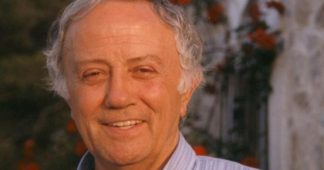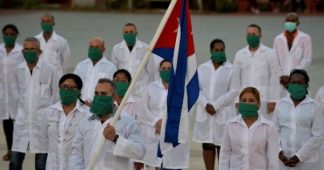As scientists around the world speed up clinical trials to find a cure or vaccine for the coronavirus, the Cuban government will begin distributing a homeopathic remedy to the elderly and other vulnerable people to “prevent” the spread of the disease, a top health official said.
Dr. Francisco Durán, national director of Epidemiology at the Ministry of Public Health, said in a press conference on Sunday that “sublingual drops” of the compound PrevengHo-Vir “prevent different diseases such as influenza, the common cold, dengue, and emerging viral infections such as this one.”
On Monday, Durán tried to correct his statements and said that the product “does not prevent contagion” but rather “increases resistance, the body’s defenses against a certain virus.”
Several state media outlets reported that PrevengHo-Vir is already being used in various Cuban provinces to treat the elderly and other groups vulnerable to the coronavirus. There is no internet record of PrevengHo-Vir, other than press reports about the announcement of its distribution in Cuba.
CECMED, the Cuban drug regulatory authority, said Monday it has approved the product, taking into account “the epidemiological situation at the national and international level caused by COVID-19.”
In the statement, CECMED said it “evaluated and approved” the PrevengHo-Vir, manufactured by a Cuban laboratory belonging to the biotech company BioCubaFarma, “as an alternative for the prevention of influenza, flu, dengue, and emerging viral infections.”
CECMED said that similar products to “prevent” dengue and cholera are already being used in Cuba and cited a 2009 World Health Organization resolution, presented by China, that recognizes homeopathy as a component of traditional medicine.
Other state media outlets have echoed the message that homeopathy is safe and effective.
In an interview with Juventud Rebelde daily newspaper, Dr. Fernando José Estévez Cabrera said that homeopathy was “an effective preventive weapon” against COVID-19, the disease caused by the new coronavirus.
Homeopathy became popular in Cuba in the 1990s, when the shortage of medicines during a deep economic crisis led health authorities to experiment with traditional medicine.
But there is no scientific evidence to support homeopathy, whose products use very diluted solutions of natural compounds and are based on controversial principles such as “like cures like.”
The FDA has not approved any homeopathic compound for any medical use, and the National Institutes of Health caution that “there is little evidence to support homeopathy as an effective treatment for any specific health condition.”
Like many governments in the world, Cuban leaders are testing alternatives to slow the spread of the virus, which has killed 11 people and sickened 396 as of Tuesday. Fearing the economic backlash, the Cuban authorities waited until March 20 to prohibit the entry of tourists and until March 23 to close schools. Yet it was one of the first in asking the population to wear masks to protect themselves.
The announcement about the homeopathic remedy, however, has generated discontent within the Cuban medical community.
“Are these people just ignorant and irresponsible, suggesting meaningless measures, selling agitated water?” asked Dr. Luis Carlos Silva on the website of the local newspaper Venceremos.
Silva said that portraying the use of the product as a preventive measure was “irresponsible” because “people without enough knowledge might believe they are protected.”
Silva, a professor at the University of Medical Sciences in Havana who works with several universities and international health organizations, declined to comment further.
This is not the first time that experts and officials refer to the effects of Cuban pharmaceutical products without providing scientific evidence. In particular, statements about Cuba’s Interferon Alpha 2B have raised false expectations about a “miracle” cure for fighting the coronavirus.
“Interferon is a medicine that you have to fight the viral infection, and it can be effective, as it is happening in China,” Dr. Luis Herrera told Telesur, a television channel controlled by the governments of Venezuela and Cuba. “Interferon serves to control and subsequently make the virus disappear” from the body, said Herrera, one of the creators of the Cuban version of the medication.
Cuban state media has also spread the idea that the drug is effective against the coronavirus.
“Faced with the threat posed by the COVID-19 pandemic, the Cuban pharmaceutical industry redoubles its efforts aimed at guaranteeing the production of drugs with proven efficacy against the disease, as is the case of Recombinant Human Interferon Alpha 2B,” said a report in the Cuban official newspaper Granma.
But there is no conclusive evidence on the effectiveness of this drug for the treatment of COVID-19, an issue that is currently under investigation in China, where it has been used for that purpose since the start of the outbreak in Wuhan.
Several companies produce this type of interferon, which is used to treat some types of cancer, hepatitis, and AIDS. Cuba developed its own version in the 1980s, which is now produced on the island by one of BioCubaPharma’s laboratories and in China.
Granma reported in late March that nearly 45 countries had asked to buy the drug from Cuba.
The severity of the pandemic has prompted the government to offer frequent updates on the number of cases and other statistics. Still, beyond the interferon, it has said little about a list of 22 drugs that are in use to treat patients with the virus or about the availability of ventilators, a number one issue in the United States.
Follow Nora Gámez Torres: @ngameztorres











